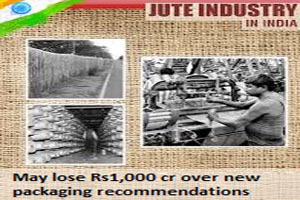
Jute industry likely to lose Rs1,000 cr over new packaging recommendations
YarnsandFibers News Bureau 2016-05-27 13:00:00 – BhubaneswarThe Commission for Agricultural Costs & Prices (CACP) has recommended reduction in compulsory packaging to 75 percent, from the present 90 percent, in case of foodgrain. As these compulsory provisions do not encourage the jute industry to develop or diversify its production lines to high-value products. But according to the jute industry, if the Union government approves the recommendations it will stand to lose Rs1,000 crore in the 2016-17 season.
The commission has favoured complete exemption in the case of sugar for packaging in jute bags. Presently, 20 percent of all sugar is needed to be compulsorily packed in jute bags, under the Jute Packaging Materials Act (JPMA).
The ministry had come out with an order under JPMA in January, mandating at least 90 per cent reservation in foodgrain and 20 per cent of the production of sugar for packing in jute bags. The order is valid till the end of June.
A leading jute mill owner said that the proposal to exempt sugar and go for further dilution in foodgrain will be a double blow. The industry is heavily dependent on government purchase and during this kharif, the requirement for jute bags for foodgrain packaging is pegged at 2.1 million bales (a bale is 180 kg). CACP's proposals are unwelcome at a time when raw jute production is expected to cross 10 million bales in the 2016-17 season.
CACP had first recommended complete exemption of sugar from the mandatory jute packaging order in 2013-14.
Indian Jute Mills Association (Ijma) has committed a supply of 300,000 bales of jute bags every month to cater to the packaging requirement for the kharif marketing season. However, Jute Commissioner Subrata Gupta during a recent meeting objected to this claim, stating the production capacity would not be more than 250,000 bales a month. He also raised concerns on rising prices of raw jute and jute bags during the rabi marketing season of 2016-17t, Ijma had argued the worries were misplaced.
In the case of sugar packing, the Union textile ministry had decided that jute mills have to abide by the supply plan finalised for May and June, for which 100,000 and 250,000 bales of bags, respectively, were to be made available to the states. The supply plan for the coming months would be decided and adjusted after the outcome of the Standing Advisory Committee meet, scheduled in the first week of June.
Market Intelligence
Ask for free sample Report

experience
Customer Base
dedicated team
Countries Served Worldwide









